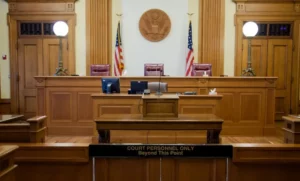You put your reputation on the line and submitted to a polygraph test, expecting to put doubts to rest once and for all. But instead of definitive answers, you’re left with an inconclusive result that provides no real clarity. Now you’re stuck in limbo, unsure of your status and still under a cloud of suspicion.
Don’t settle for ambiguity – you deserve clear and concrete answers. The good news is that you have options to appeal an inconclusive polygraph outcome. With the right strategy and support, you can get the clarity you need to move forward.
Understanding Inconclusive Polygraph Results

Before appealing, it’s important to understand what exactly an inconclusive result means. Polygraph tests measure physiological factors like blood pressure, pulse, and breathing rates to detect deception. The idea is that lying causes measurable bodily changes.
An inconclusive result means the test administrator was unable to conclude with confidence whether you were being truthful or untruthful. There are a few reasons this can happen:
- Insufficient physiological response – You may have stayed calm during questioning, without sharp changes needed to indicate deception. This can happen naturally in certain individuals.
- Ambiguous/inconsistent responses – Your physiological signs may have partially indicated deception, but the examiner deems the results ambiguous. For instance, your breathing changed, but not your blood pressure.
- Outside interference – Coughing, movement, illness, or distractions during the exam may have impacted results.
- Poor exam administration – Issues with question phrasing, testing procedures, or equipment calibration can also lead to uncertainty.
The key is that with an inconclusive result, not enough consistent and clear data was collected to make a definite truthfulness determination in either direction.
Don’t Settle – You Can Appeal
Just because the initial polygraph was inconclusive doesn’t mean you have to settle without answers. Most testing agencies have an established appeals process you can pursue.
There are two main paths to get clarity:
1. Request a Re-Examination
The simplest route is to undergo retesting with the same examiner, preferably on the same day or within a few days. This allows you to resume the test after addressing any issues that may have led to inconclusive findings. For example:
- Change positions to get more comfortable if movement was a problem
- Provide clarification on any ambiguous responses
- Ensure proper calibration of instruments
- Ask the examiner to rephrase confusing questions
A fresh start helps collect clearer physiological data needed. And it’s in the appeals department’s interest to provide definitive results.
2. Demand a Secondary Examiner
If you suspect flaws in how the initial test was conducted, you can request that a new certified examiner administer the retest. This ensures a fully impartial perspective.
Some signs that could justify demanding a second examiner include:
- You have reason to doubt the examiner’s competence or impartiality
- Question phrasing during the initial test was confusing or leading
- Proper test protocols were not followed
- Issues with instrument calibration affected data quality
A new set of eyes may identify shortcomings that led to uncertainty the first time around.
Building Your Case for Appeal

To maximize your chances of reversal, it helps to build a robust case highlighting exactly why inconclusive findings are unacceptable, and why retesting is warranted.
Here are key steps to take:
- Review the initial test methodology – Obtain records of questions asked, instrument readings, testing procedures, and the examiner’s notes. Look for any flaws or deviations from protocol.
- Consult with legal counsel – Have a lawyer review the examiner’s determination and provide an opinion on whether sufficient grounds exist to dispute it. Their expertise can strengthen your position.
- Gather witness accounts – If anyone observed testing irregularities firsthand, get written statements from them attesting to this. Eyewitness evidence makes a difference.
- Highlight tangible impacts – Document specific negative personal, professional, financial, or legal consequences you’re experiencing because of the inconclusive result. The harms justify urgency for retesting.
- Obtain expert support – Ask a certified and reputable examiner from elsewhere to assess your initial test and confirm issues meriting further review. Their credentials and impartiality will affirm your claims.
With convincing arguments and evidence backing you, it becomes very difficult for the appeals department to deny a re-examination request.
What to Expect During the Appeal Process
Once you formally submit your appeal, here’s generally what to expect:
- Initial review – The appeals department will assess your request and supporting documents to decide if a sufficient case for retesting has been made. This may take a few days to a few weeks.
- Notice of determination – They will notify you in writing whether your appeal is approved or denied. If denied, make sure the reasons are explained clearly.
- Options if denied – You may be able to resubmit with additional details and request reconsideration. If final denial still stands, consult an attorney regarding any legal resource.
- Retest scheduling – If approved, the department will contact you promptly to schedule a new test date, usually within two weeks or less. Make sure you obtain any promised accommodations, like a different examiner.
- Payment – There is sometimes a fee associated with the appeals process or retest. Inquire about payment options if needed.
- Results – The new examiner will review results soon after retesting and issue a conclusion. Finally, you will get the clarity deserved.
While not guaranteed, going through the process systematically maximizes your chance of getting indefinite findings overturned.
Partnering with the Right Polygraph Appeal Experts

For the highest chance of success, partner with qualified polygraph result appeal experts. They will:
- Offer a case assessment and identify the strongest angles to overturn the inconclusive result
- Assist you in obtaining records, gathering evidence, drafting appeals, and readying for retests
- Leverage their expertise and relationships with testing agencies to facilitate reconsideration
- Provide ongoing support until definitive answers are secured
Preparing for a Polygraph Retest
Once your appeal is approved, the retest will be scheduled quickly, usually within a couple weeks. This gives you a short window to physically and mentally prepare.
Here are some tips to get polygraph-ready again:
- Stick to your normal routine – Don’t make major changes to diet, exercise, or sleep schedules. Consistency results in better data.
- Avoid stimulants – Caffeine, energy drinks, and other stimulants the day of the test can alter physiology and skew results.
- Get a good night’s rest – Arrive well-rested. Fatigue can also affect exam quality.
- Limit distractions – Request breaks as needed to avoid complications like having to cough or sneeze during critical questioning.
- Review your strategy –Ensure your approach to questions aligns with your goal – conveying truthfulness through clear physiological response.
Leveraging Legal Resources

In addition to appeals experts, as mentioned, enlisting legal help further strengthens your position. Attorneys well-versed in polygraph exams and appeals can provide services including:
- Reviewing your full case history and initial testing issues
- Drafting a demand letter compelling the agency to approve retesting
- Facilitating transfer to an independent examiner if warranted
- Ensuring proper protocols are followed for the new test
- Observing the retest to note any concerning issues
- Challenging a denial if the appeal or retest are not approved
- Providing documentation if you wish to pursue legal remedies
Their expertise and authority can be invaluable advocates throughout the process. Don’t hesitate to involve legal counsel.
Handling Retest Nerves and Staying Calm
It’s natural to feel anxious about undergoing another high-stakes polygraph. But you want nerves to not derail your effort to get conclusive findings.
Some tips to manage test anxiety:
- Arrive early to settle in and get comfortable with the setting
- Voice any concerns beforehand so the examiner can accommodate
- Listen closely and request clarification if any questions are unclear
- Don’t feel rushed – proceed at a pace that enables you to focus
- Remember that you know the truth, and the evidence will reflect that
Staying centered mentally makes it easier for your physiology to reflect your truthful responses without distortion from nerves.
Possible Retest Outcomes and Next Steps

With the retest complete, there are three potential conclusions you may receive:
- Deceptive – An unlikely outcome given your truthful stance, but if it occurs, immediately consult your legal counsel about challenging it.
- Inconclusive – Though frustrating, it means more appeals and testing may be required to reach a conclusive verdict.
- Truthful – The ideal outcome that finally provides the definitive clarity you want to move on positively.
Regardless of the retest results, continue relying on your appeal experts and legal team to ensure your rights remain protected and your reputation is fairly assessed based on the facts. Stay resolved until your name is cleared.
With persistence and the right support, you can overturn ambiguous outcomes and finally achieve the conclusive polygraph results you seek. The appeal process takes dedication, but the clarity you’ll gain is worth the effort. Trust the truth will prevail.

